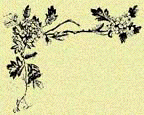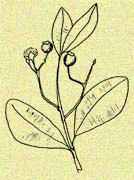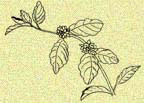Website as it looked from 2007 to 2011 on

ads would have been displayed here.
The Herb Garden
 In 1967, the Wepawaug Garden Club planned and planted a 17th Century Herb Garden on the south lawn of the Eells Stow House. They cared for it until 1973, when they turned it over to the Society. A group of Society members formed The Herbcrafters, to care for the garden and to learn about herbs and their uses. They continued to care for the garden until the Fall of 1984, when the addition of the Clark Stockade House and the Bryan Downs House made it necessary to re-landscape the grounds and move the garden.
In 1967, the Wepawaug Garden Club planned and planted a 17th Century Herb Garden on the south lawn of the Eells Stow House. They cared for it until 1973, when they turned it over to the Society. A group of Society members formed The Herbcrafters, to care for the garden and to learn about herbs and their uses. They continued to care for the garden until the Fall of 1984, when the addition of the Clark Stockade House and the Bryan Downs House made it necessary to re-landscape the grounds and move the garden.
The present Herb Garden, planted in the Spring of 1985, is in front of the Bryan Downs House. Designed as a late 18th Century Garden, it complements the age of the house. The garden on the south side of the house, started as a wild flower and shade garden, became a garden of everlasting flowers in 1986. Hurricane Gloria blew over the huge maple tree that provided shade, leaving the south side sunny.

Herb Sampler

- Basil
- Once used to draw poison from bites. Its spicy flavor now a favorite in tomato dishes and pesto. Symbolizes love or hatred.
- Bee Balm (Bergamot)
- A native plant with scented leaves and flowers used by Indians and Colonists for tea. Symbolizes compassion.
- Borage
- The blue and white flowers may be candied. The leaves add a cucumber flavor to salads. Symbolizes courage.
- Calendula (Pot Marigold)
- A syrup of petals gives strength to the heart. Dried petals give color and flavor to soups and stews. Symbolizes grief.
- Clove Pink (Gillyflowers)
- Used in medicines and cordials for the flavor of cloves. In wine, it brings comfort to the heart and strength to the brain.
- Costmary (Bible Leaf)
- Spicy and sweet smelling used as a nibble in Church, to flavor ale, and to line drawers and chests.
- Feverfew
- Various parts of this Colonial asprin used for insect bites, fever, toothache and worms. The flowers dry well. Symbolizes good health and warmth.
- Flax
- The tough stems used to spin into linen thread. The seeds produced an oil good for diseases of the chest and lungs. Symbolizes utility.
- Foxglove
- Once used for lung and liver complaints, today, used to stimulate the heart. Toxic to children and animals. Symbolizes insincerity.
- Lady's Mantle
- Dew gathered from the leaves helped to improve the complexion. A tea used to stop internal bleeding.
- Lamb's Ears
- The soft leaves were used to bandage wounds and help stop the flow of blood. Dried, they became a tea. Symbolizes support and gentleness.
- Lavender
- Used since Roman times to scent bath water. Once used for headache and faintness. Today used in soaps, oils and sachets for fragrance.
- Lemon Balm
- Once used in wine to fight fevers, in a poultice for dog or snake bites, and fresh to polish funiture. Today, used in drinks and salads.
- Lovage
- The leaves add a celery flavor to salad, soup and stew. The root, dried and ground, was good for "inward disease." Symbolizes strength.

- Mint
- A strewing herb in homes, churches and dirty streets, and rubbed on teeth to clean them. Used with lamb, peas, and fruit. A symbol of virtue.
- Monkshood (Wolfbane)
- The ground roots mixed with meat used to kell wolves. Mixed with oil, applied for rheumatism. Symbolizes misanthropy.
- Rosemary
- Used for colds and indigestion. Now used with chicken, fish, and salad. In a bride's bouquet, symbolizes happiness and fidelity, at funerals, rememberance.
- Rue
- Bruised leaves uses for gout and stiffening joints. In ale, it prevented nightmares. It can cause a skin rash. Symbolizes grace and virginity.
- Sage
- Used for nerves, blood, consumption, worms and to quicken memory. Now used in dressings, stews, cheese, and sausage. Symbolizes a long life and wisdom.
- Savory
- Excellent in bean dishes, its peppery flavor is welcome in stews. Try rubbing it on a bee sting to ease the pain.
- Sweet Cicely
- The root once boiled and served with oil and vinegar to renew strength and appetite in old people. Try it in fruit salad or a cooling drink. Symbolizes sincerity and gladness.
- Thyme
- A large aromatic family, used for colds, worms, headache and as a disinfectant. Excellent with fish, fowl, meat, eggs, breads and teas. Symbolizes bravery and courage.
- Yarrow
- Since the Battle of Troy, used to stop bleeding, ease pain and prevent infection. Chewed, it helped toothache. Today the dried flowers used in winter bouquets. Symbolizes health.

Home |

Wharf Lane |

The Herb Garden |

Members |

What's Happening |

Indian Collection |

Country Store |
 In 1967, the Wepawaug Garden Club planned and planted a 17th Century Herb Garden on the south lawn of the Eells Stow House. They cared for it until 1973, when they turned it over to the Society. A group of Society members formed The Herbcrafters, to care for the garden and to learn about herbs and their uses. They continued to care for the garden until the Fall of 1984, when the addition of the Clark Stockade House and the Bryan Downs House made it necessary to re-landscape the grounds and move the garden.
In 1967, the Wepawaug Garden Club planned and planted a 17th Century Herb Garden on the south lawn of the Eells Stow House. They cared for it until 1973, when they turned it over to the Society. A group of Society members formed The Herbcrafters, to care for the garden and to learn about herbs and their uses. They continued to care for the garden until the Fall of 1984, when the addition of the Clark Stockade House and the Bryan Downs House made it necessary to re-landscape the grounds and move the garden.








